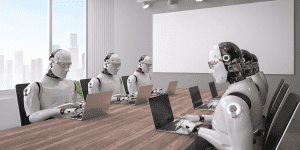Have you ever rummaged through your fridge for milk only to find a carton overflowing with AI? Me neither. However, the idea of artificial intelligence monitoring our digital cupboards for malware and expired passwords is quickly becoming a reality. So, the issue arises: will cybersecurity be replaced by AI?
Myth #1: Artificial intelligence will replace human cybersecurity specialists.

A false alarm! Artificial intelligence is great at automating boring jobs like vulnerability scanning and log analysis, but it lacks the human touch. Critical thinking, strategic planning, and ethical judgment are still reserved for human defenders. Artificial intelligence is a powerful tool, not a superhero. Imagine Batman wielding AI as his batarang, forming a dangerous pair rather than competitors.
Myth #2: AI outperforms humans in cybersecurity.
Not so fast. AI may be tireless and data-hungry, but it lacks nuance and context. A genuine user activity may set off an AI alarm, producing unwarranted concern. Furthermore, AI can be manipulated, which means bad guys could use it as a tool. Always remember that AI is only a tool and not a magic shield.
So, what does the future hold? Growth rather than obsolescence. Cyber threats are going through the roof, and people skilled in safety will continue to be in high demand. However, the skill set will evolve. Professionals will need to learn how to use AI tools while improving their human strengths to become “augmented defenders.” If you learn AI, you won’t lose your standard cybersecurity skills; instead, they’ll become superpowers that work together to fight cybercrime.
Should you learn machine learning or cybersecurity?
Follow your passions! Both provide intriguing career opportunities that are in high demand. Cybersecurity could be a good fit if you enjoy solving technical problems and protecting digital castles. Machine learning could be the right fit if you’re interested in data analysis and designing intelligent systems. Remember that both professions are interconnected, and knowledge of both could give you a big future advantage.
What about pen testers? Will AI replace them?
Not precisely. AI can automate some penetration testing jobs, but the human aspect is still essential. Pen testers must think like attackers, uncover new vulnerabilities, and adapt to unexpected situations. AI can be their digital assistant, but it cannot replace their critical thinking and judgment.
AI can be their digital assistant, but it won’t be able to think critically or make decisions for them.
Is cybersecurity a good career choice for the future?
Absolutely! The global cybersecurity market is expected to total $340 billion by 2026. Skilled pros are in high demand when it comes to technical issues, strategic planning, or ethical problems. So, whether you’re a tech whiz or a security strategist, cybersecurity is a lucrative and future-proof job path.
To summarize, AI’s rise in cybersecurity is an evolution rather than a takeover. Humans and computers can work together to make the future more proactive and resistant to cyber threats. Accept the AI revolution, develop your abilities, and join the ranks of the augmented defenders; the future of cybersecurity awaits!
Leave a Reply